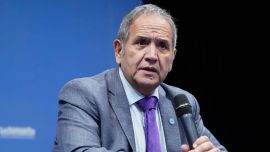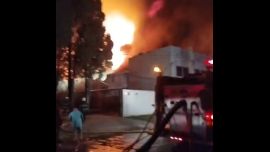Alberto Fernández on Wednesday formally announced that he is sending a bill to Congress to reform Argentina's justice system. The president has also established an advisory commission of 11 legal experts that will consider the standing of the Supreme Court, the Magistrates Council (the court system’s disciplinary body), and the prosecutor's office. The commission has 90 days to recommend changes.
Fernández, a centre-left Peronist who is a law professor, said that politicians in office have for too long manipulated court cases and judges for their benefit. The twist is that the country's political leaders will take charge of altering an independent branch of power they deem corrupt because this draft will be the subject of debate in Congress. The ruling Frente de Todos coalition controls the Senate, but it does not have a majority in the lower house Chamber of Deputies, meaning that some kind of negotiation with the opposition will have to take place in order for the reform to be approved.
The centre-right opposition coalition has already issued a statement saying that it does not back the reform. Juntos por el Cambio (JxC) is a coalition of three parties and it has recently had internal disagreements while some of its leaders, mainly Buenos Aires City Mayor Horacio Rodríguez Larreta, are working with the president during the coronavirus pandemic in a show of bipartisan civility. But the president's court reform has united the centre-right opposition against it. On Wednesday night, residents in some Buenos Aires City neighbourhoods (all in JxC bastions) banged pots and pans after the president’s announcement. Another protest has been called for August 17.
Last month, a protest on Independence Day (July 9) was held mainly against the government’s plan to expropriate the debt-ridden grain exporter Vicentin. The nationalisation plan has since been put on ice. Still, the ruling coalition has room to negotiate with Peronist lawmakers in the lower house who are not part of its caucus, in order for them to approve the court reform. The president backpedalled on submitting a nationalisation bill for Vicentin when the protests, agitated by the farm sector, broke out last month. A wealth tax bill endorsed by the president has not made any progress in Congress either. The court system reform will truly test the ruling coalition's capacity for the first time since Fernández took office late last year. Approval of a bill that is likely to face fierce opposition during parliamentary debate could lead to further protests.
The judicial reform bill is mainly directed at limiting the power of 12 federal judges based in Buenos Aires City, who under the new system would be part of 46 federal courts in total in the capital. More federal courts will be established in provinces too. Many politicians have faced court investigations, including Vice-President Cristina Fernández de Kirchner (for corruption) and former centre-right president Mauricio Macri (for espionage). According to reports, there is also a potential plan to increase the number of Supreme Court justices from five to nine. Fernández has historically argued that five justices was sufficient. The president on Thursday insisted that the number of justices was not an issue, but he said the Supreme Court was “paralysed” and is not working properly. How will the justices who were not present when he delivered his speech react to that?
Only one Supreme Court justice, Elena Highton de Nolasco, attended Wednesday's presidential announcement at the Casa Rosada, which was taken to mean that the other four justices are not happy with the proposed changes. Critics also insist that the reform is in reality designed to take some legal pressure off Fernández de Kirchner, who is facing trial in a number of corruption cases. Critics have meanwhile complained that one of the members appointed to the advisory commission, Carlos Beraldi, is the vice-president’s lawyer. In contrast, supporters of the reform argue that Argentina’s federal judges are prone to working in favour of Argentina's conservative lobbies and that Macri, during his 2015-2019 mandate, used operatives and state intelligence service agents to manipulate the courts in his favour and against the Peronist opposition, especially the former president.
The Supreme Court has been at the centre of political controversy many times in Argentina’s past. Carlos Menem, a neoconservative president who served from 1989 to 1999, was accused of enjoying an “automatic majority” in the Supreme Court (which wasd headed by one of his cronies from La Rioja Province). Protesters during the economic meltdown of 2001, when clients were unable to withdraw their money from banks, directed their wrath at politicians but also at the pro-Menem Supreme Court. Late president Néstor Kirchner, elected in 2003, made a point of rapidly introducing a new screening process to appoint fresh Supreme Court members to assure its independence. It was that reform of the Supreme Court that won praise for Kirchner, even from the opposition, and increased his popularity after he had been elected president with only 22 percent of the vote when Menem refused to face him in a run-off. Macri, immediately after taking office, came under fire when he tried, and ultimately failed, to skirt Congress and summarily name Supreme Court justices while the Senate was in recess.
The difficulty for Alberto Fernández is that since Kirchner’s widely-praised reform in 2003 the Supreme Court has been independent. The president’s plan to follow the recipes of the new advisory commission, which would potentially see the number of Supreme Court members increase to nine (or even higher), could be seen as an affront against the sitting justices.



















Comments